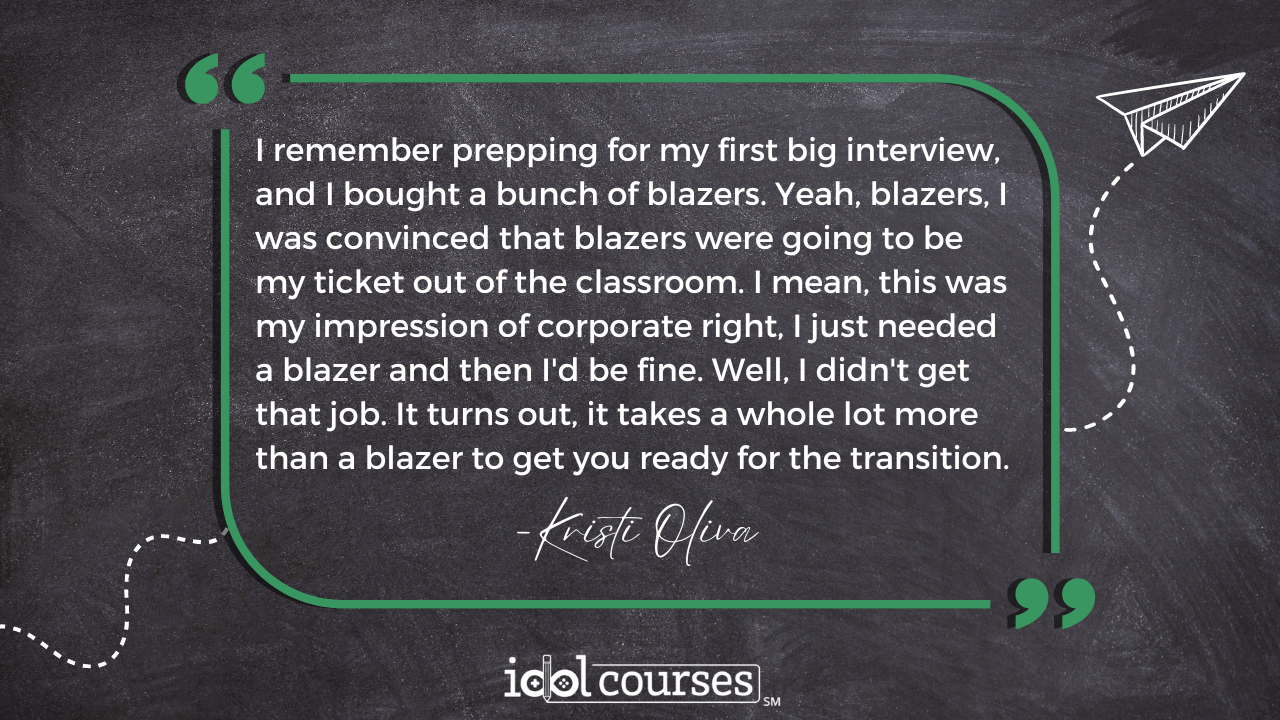Leaving the Classroom Episode 3: 5 Things You Need to Know About Corporate
Mar 21, 2023
Leaving the Classroom: A Transitioning Teacher Podcast
5 Thing You Need to Know About Corporate
Today I am talking about one of the biggest fears I had when I began to consider leaving the classroom. Starting over.
According to a National Education Association survey in 2021, 37% of educators are considering leaving the classroom earlier than they had planned. That went up six months later to 55%. Teachers are leaving the profession and starting over. And if you are considering leaving the classroom and entering the corporate world, there are some things you need to know.
Listen to the episode here:
Connect with Kristi on LinkedIn
Enjoy the podcast transcription:
Hello, welcome to leaving the classroom. I'm Kristi Oliva. Today I'm talking about one of the biggest fears I had when I began to consider leaving the classroom starting over. Now, according to a National Education Association survey in August of 2021 37% of educators are considering leaving the classroom earlier than they had planned. And that went up six months later to 55%. I'm sure none of you are surprised by that number though I'm not.
I mentioned in episode one that teaching was all I ever wanted to do. And it's true. When they went around my kindergarten class asking what everybody wanted to be when they grow up. I said teacher in high school, when everyone starts talking about what they will major in at college, I said education. It's all I ever wanted to do. So it shouldn't surprise you that I struggled hard when I decided to change careers. I had no clue what to do or what I was even qualified for. I think I went through the normal lineup that a teacher leaving the classroom goes through principle, professor.
But what else is there? All that kept coming to mind we're education type jobs, selling textbooks, that person who comes to the school and runs the teachers through a workshop on the newly adopted curriculum. And nevertheless, I kept placing myself in positions that were closely related to K12. And honestly, I didn't really want that. I wanted out of education. Thank God, I discovered ID. Instructional Design is one of those roles that I didn't realize existed. Not many people do. But once I decided to go the ID route, I was excited. But the self doubt did start to creep in. I had never done anything as an adult, but teach. I mean, even in college, I taught gymnastics. It's all I ever did was teach. And I had no clue what to expect.

Shocking. I know. And I don't say this to scare you. But just to prepare you for the journey. There are so many new things when it comes to a corporate job. From the interview process to annual reviews. It's all so different. And that brings me to this week's list. Five things you need to know about corporate.
Okay, here we go. Corporate is competitive. People aren't staying long in teaching anymore, and there's a shortage of teachers. So it's easy to see that the teaching career is not competitive. In fact, they're like begging you to come right. According to vox.com, more than 44% of new teachers leave the profession within five years. If anything, you have to wait in line in order to leave teaching that's more competitive not getting in. Teachers are leaving in mass. The United States is facing a national shortage of 300,000 teachers and school staff according to the National Education Association. In fact, some states are lowering the entry standard for new teachers. Arizona no longer requires teachers to have a bachelor's degree. And Florida is offering temporary teaching credentials to veterans without certifications. However, in many corporate roles, there's an intensive interview process. And they usually require advanced degrees and three to five years of experience for an entry level position. According to Forbes, the average number of people who tend to apply for a single job is 118, and only 20% of them get invited to an interview. So you see what I mean. It's very different. The corporate world/education, just the entry.
Okay. Next, the evaluation process. I don't know about you, but as a teacher, I was not observed very often. And rarely formula formally evaluated. There were years the principal never saw the inside of my classroom. And if I saw the principal or any other administrator, it would make me highly anxious because I immediately questioned if I was in trouble or had I done something wrong. Why were they here? And you know what I'm talking about. They come in with their little clipboard and their cronies, usually the superintendent or somebody higher up, and they sit in my classroom for me maybe two minutes. And then they leave. Sometimes they'll do that thing where they sit next to a kid in your classroom and ask them questions about what you're doing in class. Do you know what the learning expectation is? What have you been doing in this class? So was I evaluated? I mean, the short answer is no. You can't tell what is going on in my classroom, a two minute walkthrough or even a two hour evaluation. How does that tell you how well the rest of the time with these students behind closed doors is going? It's a terrible practice. Okay, so in corporate positions, it's very different evaluations happen regularly, annually, at least, and sometimes even as often as quarterly. And you're actually evaluated on your performance. What a concept. Okay, they're not asked. I mean, they are asking sometimes your peers how you're performing, but it's not solely evaluated on a snapshot like it is in teaching. And it's definitely not decided by students the way it is in education. Okay, you determine your performance.
All right, next up that you need to know about corporate is that you need to be able to thrive in a fast paced, ambiguous environment. Now, this might feel simple to teachers who deal with constant chaos and craziness. And you're right, you probably will do well with this. But the corporate version of ambiguity looks different. So let me just tell you about that. Okay, this can vary. But I have worked for three really large companies. So far, my corporate career and things are constantly changing, and continuously shifting, and fast. Okay, in my experience, decisions are made much quicker. And changes happen all the time, and much more quickly than anything I experienced as a teacher. I mean, just think about when a new curriculum is adopted, for instance, at a school, you know, they go through the panel, they have teachers that volunteer to look over the curriculum, it takes a while, and then they make the change. In corporate, it's very different. It can change day to day, week to week, you just never know.
Next up, everything is negotiable. And I mean, everything. This is corporate, I'm talking about not teaching, I bet you knew that already. From negotiating your work hours and salary before being hired to negotiating who you work with, or what you're working on. It's all negotiable. Okay, when I first got hired to Amazon, I was hired to be an instructional designer. So that means I was supposed to be designing and building courses. But less than a year later, I'm a program manager. Well, how did that happen? So basically, when I joined Amazon as an instructional designer, I went through their design process, I saw how their courses were built, I saw how their design choices were made. And I saw one flaw that I thought could use a fix. And that was their assessments. I am the program manager of assessment strategy now. And this is how it happened. I respectfully pointed out that the way they were doing assessments is really not best practice. And I proposed a solution. Now, this is the difference. If you are going to point out something that needs to be solved in the corporate world, you better show up with a solution. And so I did, I wrote a paper, I showed them exactly how much better it could be. Enter me now as the program manager for assessment strategy, which they did not have that role before. Okay, so I got to decide what was going to happen in my career by simply pointing out something that I didn't think was going well, and coming up with a valuable solution that now I'm implementing.
The other thing you need to know about corporate and you're going to be so excited about this one is you are treated like a professional. Just let that sink in for a second because I know so many of you are feeling like you are undervalued, like you are not treated as a professional who has a four year or even further degree, you are treated as less than okay. But in corporate, you are treated as a professional. I was so nervous to join the corporate world because I thought coming from teaching that my ideas would not be valued, I thought I'd be treated very similarly to I wasn't teaching and kind of, it's almost like that feeling of like patting a kid on the head and good idea that sounds real nice. Well, in corporate, it's not the same. And right out of the gate, my opinion was valued, not only because I was coming from an outside perspective of someone who had never been in corporate, but as someone who was in the education space, they knew that I brought value to their learning and development department. And that's huge.
So those are the five things that you need to know about corporate and I'd love to hear from you. Send your stories or your questions to [email protected] or share them with me on Instagram @leavingtheclassroom. This is Kristi Oliva. See you next time. That's all for this episode, but you can find more at idolcourses.com or subscribe to the podcast. And if you are ready to leave the classroom, use my code CLASSROOM100 And get $100 off enrollment to IDOL courses Academy.
Stay connected with news and updates!
Join our mailing list to receive the latest news and updates from our team.
Don't worry, your information will not be shared.
We hate SPAM. We will never sell your information, for any reason.


